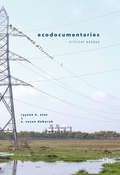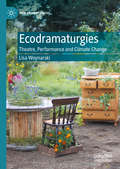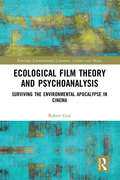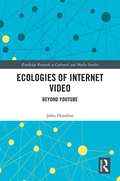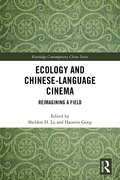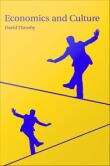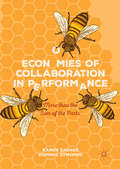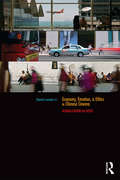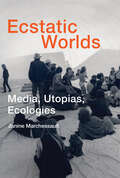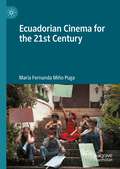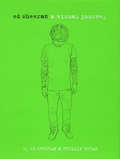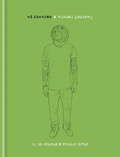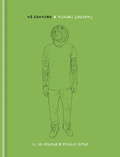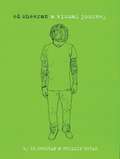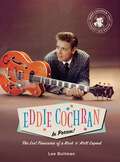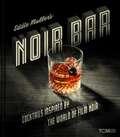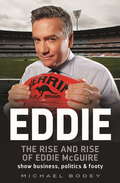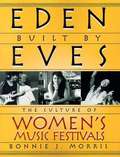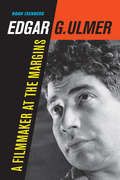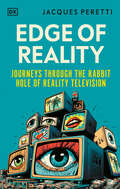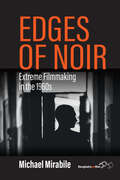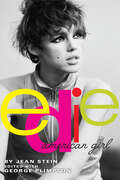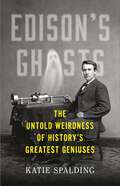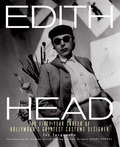- Table View
- List View
Ecodocumentaries
by Rayson K. Alex S. Susan DeborahThis book features ten critical essays on ecodocumentaries written by eminent scholars from India, USA, Ireland, Finland and Turkey in the area of ecocinema studies. Situating social documentaries with explicit ecological form and content, the volume takes relational positions on political, cultural and conservational aspects of natures and cultures in various cultural contexts. Documentaries themed around issues such as electronic waste, animal rights, land ethics, pollution of river, land grabbing, development and exotic plants are some of the topics ecocritiqued in this volume.
Ecodramaturgies: Theatre, Performance and Climate Change (New Dramaturgies)
by Lisa WoynarskiThis book addresses theatre’s contribution to the way we think about ecology, our relationship to the environment, and what it means to be human in the context of climate change. It offers a detailed study of the ways in which contemporary performance has critiqued and re-imagined everyday ecological relationships, in more just and equitable ways. The broad spectrum of ecologically-oriented theatre and performance included here, largely from the UK, US, Canada, Europe, and Mexico, have problematised, reframed, and upended the pervasive and reductive images of climate change that tend to dominate the ecological imagination. Taking an inclusive approach this book foregrounds marginalised perspectives and the multiple social and political forces that shape climate change and related ecological crises, framing understandings of the earth as home. Recent works by Fevered Sleep, Rimini Protokoll, Violeta Luna, Deke Weaver, Metis Arts, Lucy + Jorge Orta, as well as Indigenous activist movements such as NoDAPL and Idle No More, are described in detail.
Ecological Film Theory and Psychoanalysis: Surviving the Environmental Apocalypse in Cinema (Routledge Environmental Literature, Culture and Media)
by Robert GealThis book applies ecolinguistics and psychoanalysis to explore how films fictionalising environmental disasters provide spectacular warnings against the dangers of environmental apocalypse, while highlighting that even these apparently environmentally friendly films can still facilitate problematic real-world changes in how people treat the environment. Ecological Film Theory and Psychoanalysis argues that these films exploit cinema’s inherent Cartesian grammar to construct texts in which not only small groups of protagonist survivors, but also vicarious spectators, pleasurably transcend the fictionalised destruction. The ideological nature of the ‘lifeboats’ on which these survivors escape, moreover, is accompanied by additional elements that constitute contemporary Cartesian subjectivity, such as class and gender binaries, restored nuclear families, individual as opposed to social responsibilities for disasters, and so on. The book conducts extensive analyses of these processes, before considering alternative forms of filmmaking that might avoid the dangers of this existing form of storytelling. The book’s new ecosophy and film theory establishes that Cartesian subjectivity is an environmentally destructive ‘symptom’ that everyday linguistic activities like watching films reinforce. This book will be of great interest to students and scholars of film studies, literary studies (specifically ecocriticism), cultural studies, ecolinguistics, and ecosophy.
Ecologies of Internet Video: Beyond YouTube (Routledge Research in Cultural and Media Studies)
by John HondrosThis book explores the complex, dynamic, and contested webs of relationships in which three different groups of video makers found themselves when distributing their work on the Internet. It draws upon both the Deleuzian notion of "assemblage" and Actor-Network Theory, which together provide a rich conceptual framework for characterizing and analysing these webs. The groups examined are a UK video activist project, a community of film and television fans originating in the US, and an association of US community television producers. Rather than taking YouTube as its point of departure, this book centres on the groups themselves, contextualizing their contemporary distribution practices within their pre-Internet histories. It then follows the groups as they drew upon various Internet technologies beyond YouTube to create their often-complex video distribution assemblages, a process that entangled them in these webs of relationships. Through the analysis of detailed ethnographic fieldwork conducted across a period of several years, this book demonstrates that while the groups found some success in achieving their various goals as video makers, their situations were often problematic and their agency limited, with their practices contested by both human and technological actors within their distribution assemblages.
Ecology and Chinese-Language Cinema: Reimagining a Field (Routledge Contemporary China Series)
by Sheldon H. Lu Haomin GongThis edited collection explores new developments in the burgeoning field of Chinese ecocinema, examining a variety of works from local productions to global market films, spanning the Maoist era to the present. The ten chapters examine films with ecological significance in mainland China, Hong Kong, and Taiwan, including documentaries, feature films, blockbusters and independent productions. Covering not only well-known works, such as Under the Dome, Wolf Totem, Tie Xi Qu: West of the Tracts, and Mermaid, this book also provides analysis of less well-known but critically important works, such as Anchorage Prohibited, Luzon, and Three Flower/Tri-Color. The unique perspectives this book provides, along with the comprehensive engagement with existing Chinese and English scholarship, not only extend the scope of the growing field of ecocinematic studies, but also seeks to reform the means through which Chinese-language eco-films are understood in the years to come. Ecology and Chinese-Language Ecocinema will be of huge interest to students and scholars in the fields of Chinese cinema, environmental studies, media and communication studies.
Economics and Culture
by David ThrosbyIn an increasingly globalised world, economic and cultural imperatives can be seen as two of the most powerful forces shaping human behaviour. This book considers the relationship between economics and culture both as areas of intellectual discourse, and as systems of societal organisation. Adopting a broad definition of culture, it explores the economic dimensions of culture, and the cultural context of economics. The book is built on a foundation of value theory, developing the twin notions of economic and cultural value as underlying principles for integrating the two fields. Ideas of cultural capital and sustainability are discussed, especially as means of analysing the particular problems of cultural heritage, drawing parallels with the treatment of natural capital in ecological economics. The book goes on to discuss the economics of creativity in the production of cultural goods and services; culture in economic development; the cultural industries; and cultural policy.
Economies of Collaboration in Performance: More than the Sum of the Parts
by Dominic Symonds Karen SavageThis is a book about collaboration in the arts, which explores how working together seems to achieve more than the sum of the parts. It introduces ideas from economics to conceptualize notions of externalities, complementarity, and emergence, and playfully explores collaborative structures such as the swarm, the crowd, the flock, and the network. It uses up-to-date thinking about Wikinomics, Postcapitalism, and Biopolitics, underpinned by ideas from Foucault, Bourriaud, and Hardt and Negri. In a series of thought-provoking case studies, the authors consider creative practices in theatre, music and film. They explore work by artists such as Gob Squad, Eric Whitacre, Dries Verhoeven, Pete Wyer, and Tino Seghal, and encounter both live and online collaborative possibilities in fascinating discussions of Craigslist and crowdfunding at the Edinburgh Festival. What is revealed is that the introduction of Web 2.0 has enabled a new paradigm of artistic practice to emerge, in which participatory encounters, collaboration, and online dialogue become key creative drivers. Written itself as a collaborative project between Karen Savage and Dominic Symonds, this is a strikingly original take on the economics of working together.
Economy, Emotion, and Ethics in Chinese Cinema: Globalization on Speed (Routledge Contemporary China Series)
by David Leiwei LiThe First and Second Comings of capitalism are conceptual shorthands used to capture the radical changes in global geopolitics from the Opium War to the end of the Cold War and beyond. Centring the role of capitalism in the Chinese everyday, the framework can be employed to comprehend contemporary Chinese culture in general and, as in this study, Chinese cinema in particular. This book investigates major Chinese-language films from mainland China, Taiwan, and Hong Kong in order to unpack a hyper-compressed capitalist modernity with distinctive Chinese characteristics. As a dialogue between the film genre as a mediation of microscopic social life, and the narrative of economic development as a macroscopic political abstraction, it engages the two otherwise remotely related worlds, illustrating how the State and the Subject are reconstituted cinematically in late capitalism. A deeply cultural, determinedly historical, and deliberately interdisciplinary study, it approaches "culture" anthropologically, as a way of life emanating from the everyday, and aesthetically, as imaginative forms and creative expressions. Economy, Emotion, and Ethics in Chinese Cinema will appeal to students and scholars of Chinese cinema, cultural studies, Asian studies, and interdisciplinary studies of politics and culture.
Ecstatic Worlds: Media, Utopias, Ecologies (Leonardo)
by Janine MarchessaultWhen media translate the world to the world: twentieth-century utopian projects including Edward Steichen's “Family of Man,” Jacques Cousteau's underwater films, and Buckminster Fuller's geoscope.janine
Ecuadorian Cinema for the 21st Century
by María Fernanda Miño PugaEcuadorian cinema has been largely overlooked in film scholarship, usually being limited to brief descriptions in Latin American compendiums. Ecuadorian cinema for the 21st century would be the first major publication in English to fill this gap. It provides a thorough account of film activities during the new millennium, while also referring to the country’s previous film history. Specifically, this book discusses the so-called ‘mini-boom” in Ecuadorian cinema, and its relation to industry structures, film policy, and the context of Socialism for the 21st century, hence the chosen terminology of “Ecuadorian cinema for the 21st century”. What makes this project distinctive, aside from the originality of its content, is its transdisciplinary methodology. As a means to frame the textual analysis of selected films, this book discusses theories on national cinemas, memory, political ideology, and production practices, in an interdisciplinary approach that can be emulated in later projects. For this purpose, the book is divided into five chapters, in addition to a brief introduction and conclusion. Each chapter relies on specific case studies to discuss local narratives and documentaries, whether state sponsored or privately funded, centring primarily on films that premiered in commercial theatres between 2006 and 2016.
Ed Sheeran: A Visual Journey
by Ed Sheeran Phillip ButahEd Sheeran is the soulful singer-songwriter from England who has captivated American audiences. With words by Ed Sheeran and illustrations by his childhood friend, artist Phillip Butah (who produces artwork for Sheeran’s albums and singles), and accompanying photos, Ed Sheeran: A Visual Journey is an exclusive, fully authorized, first-person account by Ed of how he became an internationally renowned singer-songwriter. In the book, Ed explores his early musical experiences and influences as well as his time recording and touring, right up to the release of his second album, 'x’. The book reveals what drives and inspires Ed as he continues to evolve as an artist, while coping with stratospheric success. With close to 100 photographs and illustrations this is a book that all Ed Sheeran fans would love to own and cherish.
Ed Sheeran: A Visual Journey
by Phillip Butah Ed Sheeran Sheeran)With words by Ed Sheeran and illustrations by his childhood friend, artist Phillip Butah (who produces artwork for Sheeran's albums and singles), and accompanying photos, Ed Sheeran: A Visual Journey is an exclusive, fully authorised, first-person account by Ed of how he became an internationally renowned singer-songwriter.In the book, Ed explores his early musical experiences and influences as well as his time recording and touring, right up to the release of his second album, 'x'. The book reveals what drives and inspires Ed as he continues to evolve as an artist, while coping with stratospheric success, and is an honest account of what it takes to make it in the music business.With Phillip Butah's distinctive portraits of Ed throughout, this is a unique book celebrating a unique musician. It includes Ed's recollections of working tirelessly on the London gig circuit and self-releasing EPs, working hard on finding his sound, signing to Asylum Records and recording his huge hit album, '+', performing at the Grammys, touring with Taylor Swift and sell-out headline gigs at Madison Square Garden. It takes us up to Ed as a musician today, including recording his new album, 'x'.
Ed Sheeran: A Visual Journey
by Phillip Butah Ed Sheeran Sheeran)**This enhanced edition includes behind-the-scenes videos of the making of the book and an exclusive message from Ed.** With words by Ed Sheeran and illustrations by his childhood friend, artist Phillip Butah (who produces artwork for Sheeran's albums and singles), and accompanying photos, Ed Sheeran: A Visual Journey is an exclusive, fully authorised, first-person account by Ed of how he became an internationally renowned singer-songwriter. In the book, Ed explores his early musical experiences and influences as well as his time recording and touring, right up to the release of his second album, 'x'. The book reveals what drives and inspires Ed as he continues to evolve as an artist, while coping with stratospheric success, and is an honest account of what it takes to make it in the music business. With Phillip Butah's distinctive portraits of Ed throughout, this is a unique book celebrating a unique musician. It includes Ed's recollections of working tirelessly on the London gig circuit and self-releasing EPs, working hard on finding his sound, signing to Asylum Records and recording his huge hit album, '+', performing at the Grammys, touring with Taylor Swift and sell-out headline gigs at Madison Square Garden. It takes us up to Ed as a musician today, including recording his new album, 'x'.
Ed Sheeran: A Visual Journey
by Ed Sheeran X Phillip ButahEd Sheeran is the soulful singer-songwriter from England who has captivated American audiences. With words by Ed Sheeran and illustrations by his childhood friend, artist Phillip Butah (who produces artwork for Sheeran’s albums and singles), and accompanying photos, Ed Sheeran: A Visual Journey is an exclusive, fully authorized, first-person account by Ed of how he became an internationally renowned singer-songwriter. In the book, Ed explores his early musical experiences and influences as well as his time recording and touring, right up to the release of his second album, 'x’. The book reveals what drives and inspires Ed as he continues to evolve as an artist, while coping with stratospheric success. With close to 100 photographs and illustrations this is a book that all Ed Sheeran fans would love to own and cherish.
Eddie Cochran: The Lost Treasures of a Rock 'n' Roll Legend
by Lee BullmanIn the golden era of rock 'n' roll, there was one name who rivaled Elvis Presley, both in style and talent: Eddie Cochran. In his short 21 years, Eddie Cochran changed the face of music forever—despite his life being cut tragically cut short when he died in a car crash on his 1960 tour of England. Born in a small town in Minnesota to humble beginnings, Eddie unleashed a wave of raw talent and energy that defied the norms of the era, becoming a trailblazer of the rockabilly sound and look. His smash hits &“Summertime Blues,&” &“C&’mon Everybody,&” and &“Three Steps to Heaven&” are still entertaining audiences and being covered by musicians today, some sixty years after they were first recorded. Cochran&’s guitar style and songwriting not only landed him in the Rock and Roll Hall of Fame, it has influenced nearly every major rock &‘n&’ roll musician, from Paul McCartney and Marc Bolan, to Bruce Springsteen and Joan Jett. Eddie Cochran: In Person! not only details the life and career of a rock 'n' roll icon, it tells the extraordinary story of how a collector came into possession of the contents of Eddie&’s childhood bedroom, which had remained undisturbed and unseen by anyone outside of the Cochran family since his death. Cochran&’s fascinating story, lavishly illustrated with personal mementos, scrapbooks, and even a mockup of his never-released second album, all thought lost for more than sixty years, as well as exquisite performance and portrait photography, paints a picture of what it was like to be a rock &‘n&’ roll superstar on a meteoric rise. NEVER-BEFORE-SEEN COLLECTOR&’S PIECES: All the images and ephemera collected in this book are being published for the first time. ONE OF A KIND: Eddie Cochran: In Person! is the first photographic biography to chronicle the life and times of Eddie Cochran, immortalizing the artist in stunning high-resolution photos and ephemera. BEST-SELLING AUTHOR Lee Bullman (Blowback, Twenty Sixteen) provides expert insight into the life and times of Eddie Cochran, giving an intimate glimpse into the man behind the music.
Eddie Muller's Noir Bar: Cocktails Inspired by the World of Film Noir (Turner Classic Movies)
by Eddie MullerEddie Muller—host of TCM's Noir Alley, one of the world's leading authorities on film noir, and cocktail connoisseur—takes film buffs and drinks enthusiasts alike on a spirited tour through the "dark city" of film noir in this stylish book packed with equal parts great cocktail recipes and noir lore. Eddie Muller's Noir Bar pairs carefully curated classic cocktails and modern noir-inspired libations with behind-the-scenes anecdotes and insights on 50 film noir favorites. Some of the cocktails are drawn directly from the films: If you've seen In a Lonely Place and wondered what&’s in a &“Horse&’s Neck&”—now you&’ll know. If you&’re watching Pickup on South Street you&’ll find out what its director, Sam Fuller, actually drank off-screen. Didn&’t know that Nightmare Alley&’s Joan Blondell inspired a cocktail? It may become a new favorite. Meanwhile, Rita Hayworth is toasted with a "Sailor Beware," an original concoction which, like the film that inspired it (The Lady From Shanghai), is unique, complex, and packs a wallop. Featuring dozens of movie stills, poster art, behind-the-scenes imagery, and stunning cocktail photography, Noir Bar is both a stylish and exciting excursion through classic cinema&’s most popular genre.
Eddie's Friend Boodles
by Carolyn HaywoodA visit to the circus inspires Boodles to experiment with clown makeup and to try to teach his dog Poochie to do tricks.
Eddie: The rise and rise of Eddie McGuire
by Michael BodeyThe inspiring biography of one of Australia's best-known businessmen, TV stars and footy club presidents.Eddie McGuire charts the incredible rise of Edward Joseph McGuire AM from his childhood in the working-class Melbourne suburb of Broadmeadows, through his nightclub days as an ambitious young sports reporter to the heights of television, radio,the AFL and politics.Award-winning author and journalist Michael Bodey explores McGuire's rise to the presidency of the most popular football club in the land, Collingwood; his creation of Channel Nine's 'The Footy Show'; his ascent to become Australian television's 'Eddie Everywhere' before his unlikely appointment as Nine's CEO and 'Five Million Dollar Man'; as well as his political ambitions, including his role opposite Malcolm Turnbull heading the republican campaign.Covering Eddie McGuire's many feuds, his missteps, his successes, the turnaround of his beloved Magpies and his seemingly unstoppable rise, this is the inspiring and unique story of the ultimate working-class boy made good.
Eden Built by Eves: The Culture of Women's Music Festivals
by Bonnie J. MorrisReaders take an exhilarating insider's journey through women's music festivals in the lesbian subculture complete with candid backstage interviews and photographs.
Edgar G. Ulmer: A Filmmaker at the Margins (Weimar and Now: German Cultural Criticism #48)
by Noah IsenbergEdgar G. Ulmer is perhaps best known today for Detour, considered by many to be the epitome of a certain noir style that transcends its B-list origins. But in his lifetime he never achieved the celebrity of his fellow Austrian and German émigré directors—Billy Wilder, Otto Preminger, Fred Zinnemann, and Robert Siodmak. Despite early work with Max Reinhardt and F. W. Murnau, his auspicious debut with Siodmak on their celebrated Weimar classic People on Sunday, and the success of films like Detour and Ruthless, Ulmer spent most of his career as an itinerant filmmaker earning modest paychecks for films that have either been overlooked or forgotten. In this fascinating and well-researched account of a career spent on the margins of Hollywood, Noah Isenberg provides the little-known details of Ulmer’s personal life and a thorough analysis of his wide-ranging, eclectic films—features aimed at minority audiences, horror and sci-fi flicks, genre pictures made in the U.S. and abroad. Isenberg shows that Ulmer’s unconventional path was in many ways more typical than that of his more famous colleagues. As he follows the twists and turns of Ulmer’s fortunes, Isenberg also conveys a new understanding of low-budget filmmaking in the studio era and beyond.
Edge of Reality: Journeys Through the Rabbit Hole of Reality Television
by Jacques PerettiGo behind the scenes of the most shocking, hilarious, controversial genre of entertainment: reality television.Reality TV&’s influence is seismic: twenty-five years ago, the concept didn&’t exist. Yet today, it is one of the most powerful cultural forces on earth; a multi-billion-dollar machine. Despite that, it is often derided as &“trash&”, a cultural McDonalds not worthy of examination. The truth is that reality TV offers a profound insight into who we are as human beings, questioning the very nature of what we deem to be entertaining.Writer, broadcaster, and reality TV-obsessive Jacques Peretti goes behind the scenes of a world that has entranced and consumed him for two decades. Meeting with people at every level of the reality TV machine, from those responsible for coming up with ever-more extreme formats, to the contestants and participants at the heart of some of the most iconic moments in television, who felt that their lives and their vulnerabilities were being exploited in the name of entertainment.This is reality TV as you&’ve never seen it before.
Edges of Noir: Extreme Filmmaking in the 1960s
by Michael MirabileEdges of Noir challenges the notion that noir film nearly vanished after 1958 until its subsequent “neo-noir” revival between 1973 and 1981. The 1960s, regardless of critical neglect, include some of the most provocative films of the post-World War II decades. Often formally disruptive and experimental, films including Shock Corridor (1963), Mirage (1965), The 3rd Voice (1960), and Point Blank (1967) evoke controversial issues of the era, deriving dynamic influences amongst exploitation cinema, sensationalistic American B movies, and the European New Wave movement. Whether the focus is on nuclear destruction, mind control, or surveillance, late noir films, above all else, vividly portray the collective fears from the time.
Edie: American Girl
by Jean SteinThe “exceptionally seductive biography” of the 1960s icon as told by those who knew her (Los Angeles Times Book Review).In the 1960s, actress and model Edie Sedgwick exploded into the public eye like a comet. She seemed to have it all: she was aristocratic and glamorous, vivacious and young, Andy Warhol’s superstar. But within a few years she flared out as quickly as she had appeared, and before she turned twenty-nine she was dead from a drug overdose.In a dazzling tapestry of voices—family, friends, lovers, rivals—the entire meteoric trajectory of Edie Sedgwick’s life is brilliantly captured. And so is the Pop Art world of the ‘60s: the sex, drugs, fashion, music—the mad rush for pleasure and fame. All glitter and flash on the outside, it was hollow and desperate within—like Edie herself, and like her mentor, Andy Warhol. Alternately mesmerizing, tragic, and horrifying, this book shatters many myths about the ‘60s experience in America.“This is the book of the Sixties that we have been waiting for.” —Norman Mailer
Edison's Ghosts: The Untold Weirdness of History's Greatest Geniuses
by Katie SpaldingPublishers Weekly Best Summer Reads Overturn everything you knew about history&’s greatest minds in this raucous and hilarious book, where it turns out there's a finer line between "genius" and "idiot" than we've previously known. &“As Albert Einstein almost certainly never said, everyone is a genius – but if you judge a fish by its ability to climb a tree, it will live its whole life believing that it is stupid.&” So begins Katie Spalding&’s spunky takedown of the Western canon, and how genius may not be as irrefutably great as we commonly understand. While most of us may never become Einstein, it may surprise you to learn that there&’s probably a bunch of stuff you can do that Einstein couldn&’t. And, as Spalding shows, the famous prodigies she explores here were quite odd by any definition. For example: Thomas Edison, inventor of the lightbulb, believed that he could communicate with the undead and built the world&’s very first hotline to heaven: the Spirit Phone. Marie and Pierre Curie, famous for discovering radioactivity, slept next to a lump of radioactive material for years and strapped it to their arms to watch it burn them in real-time. Lord Byron, acclaimed British poet, literally took a bear with him to university. Isaac Newton discovered the laws of gravity and motion, but he also looked up at the sun without eye protection. The result? Three days of blindness. Tesla, whose scientific work led to the invention of the AC unit, fell in love with a pigeon. Edison's Ghosts is filled with examples of the so-called best of humanity doing, to put it bluntly, some really dumb shit. You&’ll discover stories that deserve to be told but never are: the hilarious, regrettable, and downright bafflingly lesser-known achievements that never made it into our history books, until now.
Edith Head: The Fifty-Year Career of Hollywood's Greatest Costume Designer
by Jay Jorgensen"All About Eve. Funny Face. Sunset Blvd. Rear Window. Sabrina. A Place in the Sun. The Ten Commandments. " Scores of iconic films of the last century had one thing in common: costume designer Edith Head (1897u1981). She racked up an unprecedented 35 Oscar nods and 400 film credits over the course of a fifty-year career. Never before has the account of HollywoodOCOs most influential designer been so thoroughly revealedubecause never before have the Edith Head Archives of the Academy of Motion Picture Arts and Sciences been tapped. This unprecedented access allows this book to be a one-of-a-kind survey, bringing together a spectacular collection of rare and never-before-seen sketches, costume test shots, behind-the- scenes photos, and ephemera. "
